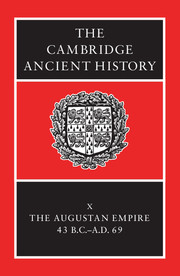12 - The Administration of Justice
from PART II - THE GOVERNMENT AND ADMINISTRATION OF THE EMPIRE
Published online by Cambridge University Press: 28 March 2008
Summary
The following chapter is concerned with the application of law, not with law and justice itself. We shall have to deal with the different courts and officers of law, with judges and procedure, with actions and punishment; the development of law from the late Republic to early Empire, its pre-classical shape and the birth of Roman legal science are described in chapter 21 of this volume.
The limits of time given for this volume are irrelevant insofar as law and administration of justice are concerned. Caesar was killed before he could start on any reform programme he may have planned, and the civil wars which began after his death postponed any serious reform until peace was restored by the new princeps. The end of the period dealt with in this volume is even less of a rupture in the field of justice. So it is best to begin with the situation as it had developed in the wake of Sulla's reforms, treat rather briefly some reforms under Augustus and his successors, and end with the state of affairs in the second half of the first century A.D..
There will be many ‘probablys’ and similar expressions in the following pages, too many perhaps in view of the fact that the period between Cicero and Tacitus is one of the best known in ancient history. But it is a lopsided picture we get, overstressing Rome and the upper classes. Legal literature on the other side is transmitted to us mostly in the pruned state passed down by Justinian's lawyers, who eliminated or altered many subjects no longer valid in the sixth century.
Keywords
- Type
- Chapter
- Information
- The Cambridge Ancient History , pp. 397 - 413Publisher: Cambridge University PressPrint publication year: 1996
References
- 3
- Cited by



